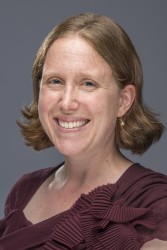Laura Rickard
Laura N. Rickard, Ph.D.
Associate Professor and Graduate Coordinator
Department of Communication and Journalism
100 Corbett Hall
University of Maine
Orono, ME 04469
Phone: (207) 581-1843
E-Mail: laura.rickard@maine.edu
Laura Rickard holds a bachelor’s degree from Brown University in Environmental Studies, and a master’s and Ph.D. in Communication from Cornell University. She joined the University of Maine in 2015 from the State University of New York College of Environmental Science and Forestry (SUNY-ESF), where she served as an Assistant Professor of Environmental Studies. When Dr. Rickard joined UMaine, she held a joint appointment in CMJ and UMaine’s Track I National Science Foundation (NSF) EPSCoR award, Sustainable Ecological Aquaculture Network (SEANET) until the grant’s conclusion in 2019. Since being promoted to associate professor with tenure, she has served as affiliated faculty in UMaine’s Senator George J. Mitchell Center for Sustainability Solutions, the Climate Change Institute, and the Aquaculture Research Institute. In addition, she serves as affiliated faculty on UMaine’s NSF Research Traineeship (NRT) grant, a selective transdisciplinary graduate training program in conservation science. She is currently CMJ’s Graduate Program Coordinator. She teaches risk communication at the graduate and undergraduate levels, as well as communication theory at the graduate level.
Her research explores the role of communication in the context of science, health, environmental, and risk-based issues. She utilizes quantitative and qualitative methods, such as surveys, experiments, and interviews, to explore complex, applied communication questions, often with policy implications, and frequently with agency partners, such as the National Park Service, or Maine Sea Grant. Presently, her research centers on two main applied contexts: (1) examining strategic messaging to influence climate change risk perceptions and behaviors; and (2) understanding public perceptions of sustainable aquaculture development. With respect to the second area, she is currently funded by the National Oceanic and Atmospheric Administration (NOAA) to research public support for land-based salmon farm development in Maine and across the U.S. and is using this project to build on insights gained from SEANET. See here for a list of publications.

